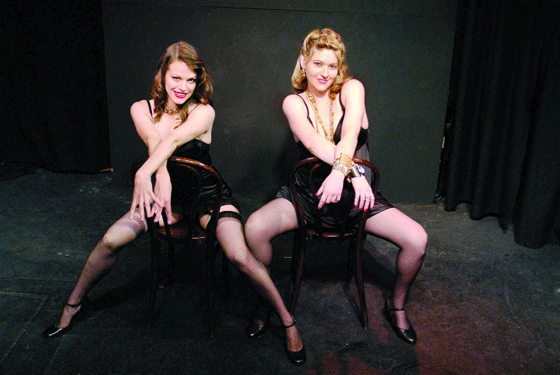By Noah Fowle
“Seduced”
Directed by Joseph Zarro
Starring Vance Clemente, Michael Smith Rivera, Amy Cassel Taft and Hannah Snyder-Beck
Playing at the Michael Chekhov Theatre
Saturdays and Sundays through August
141 Ridge Street, between Houston and Stanton Streets
(212-340-1962; chekovtheater.com)
Amy Cassel Taft and Hannah Snyder-Beck play the former flames of the mentally crippled Henry Hackamore in Sam Shepard’s “Seduced,” based on the life of Howard Hughes. It’s part of the festival dedicated to the venerated playwright, ongoing at the Michael Chekov Theater.
Dispensing with the sensationalism that covered newspapers at the time, Sam Shepard’s play “Seduced” took a peak behind the curtain of the Howard Hughes legend and crafted a tale of avarice, lust, power and purpose that might have characterized Hughes’ final days. First produced in 1979 in Providence, Rhode Island, Shepard’s work had already garnered widespread acclaim when he won the Pulitzer Prize for “Buried Child” that same year. “Seduced” originally starred the now famous film actor Rip Torn as the Hughes character, Henry Hackamore, and his portrayal helped bring the production to New York City’s crowded theatre scene. Now, “Seduced” is showing as part of the ongoing Sam Shepard Festival at the Michael Chekhov Theatre, and the play arrives to its humble stage, tucked away on the Lower East Side, with all the menace, dark humor and sexuality that characterizes Shepard’s body of work.
“Seduced” opens on the bearded and freakishly long-nailed, Henry Hackamore (Vance Clemente) a billionaire tycoon in the waning days of his life. Having fled the spotlight of America, Henry is consumed by his paranoia and obsesses over the dangers of everything from dirt to daylight. His only companion is his loyal bodyguard and nurse Raul (Michael Smith Rivera), whose bumbling efforts to please his boss belie ulterior motives.
Clemente commands the stage with his idiosyncrasies and postulates on the world as he perceives it, constantly trying to grasp and communicate his own “intellectual activity.” However, as Henry slips in and out of madness and clarity, Clemente presents him in both comic and tragic mixture. His weakend body has left him numb and practically immobile, yet he roars out orders to have himself rocked and rubbed, and insists that all of his frequent blood transfusions come from other geniuses. Despite his current immobility, Henry relentlessly reminds Raul of his once great ability to command the skies, women and his fortunes.
Although originally written in 1979, Shepard’s dialogue contains an eerie relevance to today. As Henry fiercely declares that “crisis is the normal state of affairs,” and that “nothing is harmless until it is squashed,” he seems to be describing as much his version of America, “the land of lust,” as our own.
Often confused by his own orders and instructions, Henry is held in place by Raul’s strict obedience and then consumed by sudden bouts of fear and doubt. After bragging of the sexual conquests of his youth, Henry becomes frightened when two women of his past, Luna (Amy Cassel Taft) and Miami (Hannah Snyder-Beck) show up on his invitation.
Both Taft and Snyder-Beck embrace their sultry characters and give the show a jolt of tension and humor, suggesting their motivations cannot be entirely altruistic. Both mavens at seduction, Luna and Miami seem to be plucked from the frames of film noir and chew appropriately at their dialogue. They pout for Henry, they strut for him, and yet both manage to keep a wayward eye on each other. Luna is especially two-faced when she sees the possible competition in Miami, and says with a measure of scorn, “There’s nothing like a little disappointment to broaden one’s character,” while playfully petting Henry.
As the second act begins, Henry seems to be gaining his strength, while the once murky intentions of the others are slowly revealed. With death so close, all three can almost taste Henry’s overwhelming inheritance. Henry’s near constant berating wears on Raul, whose once clumsy and friendly demeanor begins to shift towards something decidedly more sinister.
Although the performance may lag at times due to Joseph Zarro’s formulaic direction, the clever use of the music of both Randy Newman and Miles Davis manage to tease out a thicker atmosphere in the play and help rocket it towards its climax. The cast overcomes the limitations of their small space with their acerbic delivery of Shepard’s signature black comedic tone. The end result is a unique parody of the American Dream and an exploration of the futility of greed and wealth when faced with the certainty of death.


































